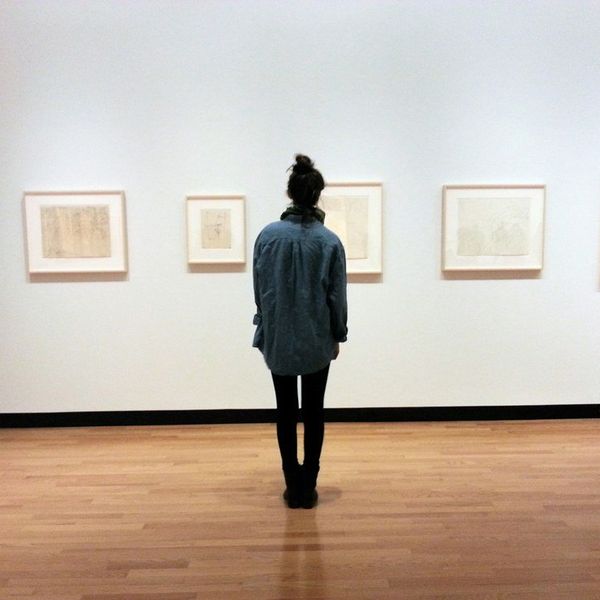We fear art. In the 21st Century, many humans fear art. We are scared to encounter it. Why?
Because we don't understand it. We're scared we won't be able to know "what it means" because we aren't smart or cultured enough. Because we put so much thought into the simple act of looking (or listening, or watching-- whichever verb is needed for all forms of art), we create this invisible wall between us and the art. We distance ourselves out of the simple fear of failure, and the quiet yet crowded art museums, galleries and exhibitions don't help ease ourselves.
These institutions only make us feel inferior in comparison to the intimidating colors and shapes within the frame, the lyrics that don’t make sense, the symbolism behind the pirouettes and leaps, or the words flowing from the poet’s mouth. Yet, there we find ourselves; nodding to the beat, clapping our hands, snapping our fingers, reading and nodding with agreement at the title of an art piece only because the person before us did the same. Aside from our own personal distance we previously created, now we struggle to pull ourselves together and make this failure disappear. We act as if we are truly enjoying what’s in front of us to seem like we’re just like everyone else, only to realize that the person before you and the person after you have no idea what they’re looking at either. Taking the characteristics just mentioned and all the countless others we come to a conclusion: we are disconnected to artistic emotion.
Throughout the hustle and bustle of all the questioned raised above, we are oblivious to the reason as to why the art form is in front of us in the first place. The art put in front of us has been created with pure human emotion. Emotion that was too passionate to stay within the artist and served as an outlet of expression. Emotion that was felt by another fellow human being, meaning that we (more or less) have once felt the same exact thing or at least something remotely similar.
The connection is there, right before our very eyes, yet we run around in circles attempting to search for something deeper within the artist. We focus on everything about the artist— their biographical facts, their artistic style, their affects within society, and yes, this is definitely of the utmost importance for educational purposes, but all this makes us forget about that the artist themselves are in fact, human. We keep ourselves and our personal connection to art out of this equation when it is all we would truly need to get the most out of what is in front of us.
The ideas discussed beforehand are all key points highlighted within Alain de Botton’s Healing Arts Theory. Botton hypothesizes that if museums were formatted and organized based on human-scale themes rather than time periods of specific artistic styles, the art itself would be easier to take in and easier to create personal connections with it. These human-scale themes would be based off of human emotions and experiences such as love, loss, marriage, failure, etc. There would be indescribable interaction between us and art, in a way that would allow us to unveil our deepest emotions and ideas-- allowing us to untie the confusing knots within.
I will attempt Botton’s theory within many forms of artistic expression that I will be presenting to you here through The Odyssey weekly, in hopes that it will make art seem more approachable to you personally. Don’t be fixated on trying to connect or remember the artist’s techniques or the time period in which they were most active— focus on how the art makes you feel; you will instantly feel a deeper connection to the artist this way. It’s time to go back to the bare basics: a subject, a viewer and a feeling. Tune in next week to see The Healing Arts in action!




















